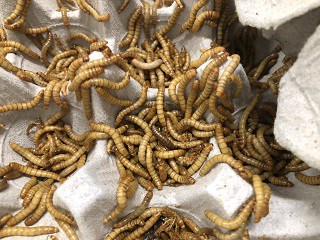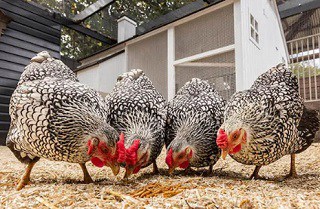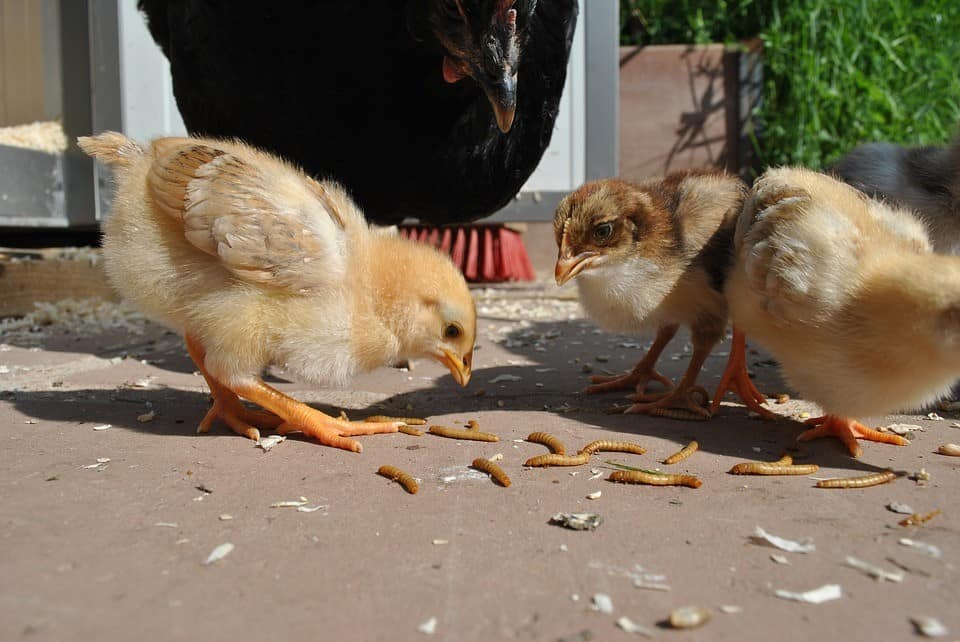Are mealworms for chickens a good idea? There have been a lot of theories about raising chickens lately. Everyone is trying to find the best way to bring up the best chicks. It’s a known fact that chickens need nutritious foods to help them grow and perform a host of bodily functions well. With the right supplements, chickens can:
- Easily fight off infections, keeping them healthier longer
- Lay strong eggs
- Grow nice, strong bodies
These supplements help chicken keepers grow nice and healthy chickens.
However, as is the case with many fads, some are a hit, and many are a miss. Is eating mealworms for chickens a hit or a miss? Should you feed your chickens dried insects to raise their animal protein intake? Chicken nutrition is important. Let’s dive in and investigate.
Mealworms for Chickens
Contrary to what the name would suggest, dried mealworms aren’t worms of any kind. They are beetle larvae. If you have ever had the chance to observe wild birds or even backyard chickens in their natural state and habitat, you will see that they like picking at the ground and swallowing whatever they find there.
For the most part, they are looking for insects and beetles. They find this kind of food both delicious and beneficial to their health in several ways.
What Are Mealworms?
Mealworms are the larvae of darkling beetles. Their life cycle is fairly simple. These worms tend to eat and grow fast during their larval stage. They pupate at around the 12–18 week mark, whereby this stage lasts for around two weeks. After that, they turn into full-fledged darkling beetles.
Mealworm colonies need to have mature adults and larvae at the same time. If you are harvesting your fresh mealworms as a treat for your chickens, you need to be careful to leave enough of them and allow them to turn into adults that will lay eggs and continue the cycle.
Without this, you risk ruining the entire colony. You could also buy dried mealworms if all this sounds like too much extra work.

Reasons Mealworms Are Good for Chickens
There’s a theory in chicken raising that a little goes a long way. Today, there are many excellent commercial chicken feed options, so you don’t have to worry about calculating how much of what nutrients your chicks are getting.
This, however, creates a bit of a thorny situation because giving your chicken too much of any one type of nutrient can be harmful to their health.
Mealworms present a much safer option for chicken raisers who don’t want to deal with this headache. Since backyard chickens are naturally predisposed to scratch and search for worms as food, giving them fresh or dried mealworms now and then can’t hurt.
With that in mind, here are some reasons and factors to keep in mind when feeding your chicks mealworms. Learn what to feed baby chicks after hatching.
A Small Amount of Fresh Mealworms Goes a Long Way
Mealworms are mostly used to boost the chickens’ protein intake. As such, only a small amount will do the trick. Try giving your chicks about 1–10 mealworms at a time.
Chicken feed designed for baby chicks typically has extra protein to help them get bigger and stronger. Adult chickens, on the other hand, need a bit more of a boost, but nothing more than 16% of their diet should be made up of proteins.
It’s also important to keep an eye on how many live mealworms you feed your hens. The fact that they are laying eggs means they can have mealworms all day if you let them.
The extra protein helps those who lay strong eggs. They also need protein intake to grow healthy plumage to keep themselves warm through the cold winter nights and days.
However, it’s important to keep that intake to a minimum. Remember, any one nutrient can throw off the chicken’s diet and adversely affect its health.
Mealworms Are a Great Source of Protein During Molting
There are a couple of things that happen to your chicken flock during molting season:
- They lose quite a bit of their plumage
- Their immune systems take a bit of a hit
It’s extremely important to increase their protein intake during the molting season for several reasons. For one thing, the increased protein intake helps the chickens grow their plumage back, which will help them stay warm during winter and look healthier.
Secondly, their immune systems are somewhat compromised during this season, so they need your input to help fortify them.
Including fly larva, yellow mealworms, and dried mealworms in their diet will help improve their immunity. It’s important to note that this doesn’t mean increasing the size of their mealworm helpings with every meal.
That will throw off the diet. It means that you should be consistent with the mealworm supply. Be consistent with that format if you give them 1–10 mealworms daily.
Mealworms for Eggs
Chicken eggs are almost entirely made up of proteins. One of the best ways to ensure that hens lay strong, tasty eggs is to supplement their diet with mealworms. These are a wonderful source of natural protein that is great for the egg-laying process and works wonders for the eggs themselves.

Mealworms for Chickens to Turn the Bedding
In their natural habitat, both wild and domesticated birds spend most of their time scratching at the ground, trying to get to whatever worms might be hiding under there. Knowing this, you can use this scratching habit to help turn the bed. Here’s what you need to do.
Take a handful of mealworms and mix them with their chicken feed. Sprinkle some of that over their deep litter system and let the chickens go to work.
Since chickens love mealworms so much, they will go into an excited frenzy and start scratching at the deep litter. The more mealworms they find, the deeper they will scratch, turning the bedding.
Not only does this allow the chickens to do what they do naturally (scratch and find their food), but it also saves you from having to do a great deal of work. You won’t have to bring out the shovels to turn the bedding. The chickens do it for you.
Train Chickens With Mealworms
Apart from raising chickens for egg production and meat, some people raise them as pets. In this case, you can use mealworms to train your chicken to perform various tricks. You can:
- Teach them to come to you whenever you call
- Jump up onto your lap
- Walk between your legs
Like most animals, chickens can learn to respond to your commands by giving them mealworms as a reward. The fact that mealworms are happy hen treats is an added bonus.
Giving Chickens Mealworms
There are several other reasons why you should consider using mealworms as a protein source for your chicken. These include:
- Mealworms have a rather long shelf life (this is especially true for dried mealworm options)
- You can make a lot of savings when you buy dried mealworms compared to live worms
- Mealworms typically can’t escape from the feeding fray or the feeder
- You don’t have to worry about refrigeration when dealing with mealworms
Mealworms are the ideal protein source for chickens. They are particularly good for chicken raisers who are looking for something simple, affordable, and effective in terms of nutrient supplements.
Whether raising chickens for egg production, meat, or as pets, feeding them mealworms is one of the best ways to give them that extra protein boost.
One of the best things about live mealworms for chickens is that, depending on how you present the meal, you allow your chicken to do what it’s naturally designed to do. That is foraging for its meal.
You can use this trick to have the chicken turn the bedding for you and help them teach baby chicks how to scratch and find their own food in the ground.
You can buy dried mealworms at stores that sell pet supplies, such as PetSmart. Local, exotic pet supplies stores will sell live mealworms.
They are also available online. In time, and depending on the size of your flock, you may decide to learn about raising mealworms for chickens at home.
Your chickens will love mealworms along with other treats. Learn about giving treats to chickens, including can chickens eat tomatoes and can chickens have strawberries. It’s important to learn about caring for chickens and if you plan to be away for a few days, how long chickens can go without food.

